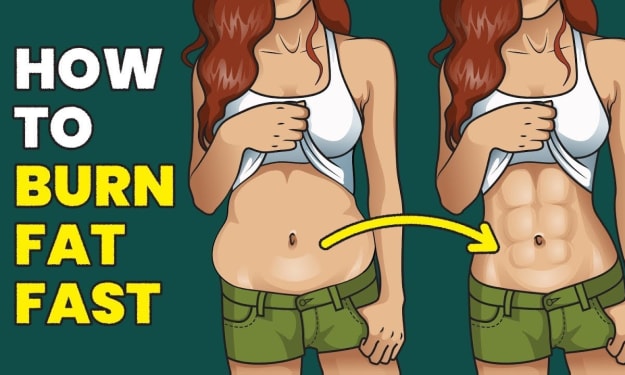What is the fastest effective way to lose weight?
fastest effective way to lose weight

There are several ways to lose weight quickly and effectively, but it's important to note that sustainable weight loss should be achieved through a combination of healthy eating habits, regular exercise, and lifestyle changes. Here are some tips that may help with quick weight loss:
1. Calorie deficit: The key to weight loss is burning more calories than you consume. To achieve this, you need to create a calorie deficit. This can be done by reducing your calorie intake through healthy eating and increasing your calorie expenditure through exercise.
To lose weight, you need to create a calorie deficit by either burning more calories through physical activity or consuming fewer calories through healthy eating. When you consume fewer calories than your body needs to maintain its current weight, your body will start using stored fat as a source of energy, which can lead to weight loss over time.
It's important to note that creating too large of a calorie deficit can actually backfire and make it harder to lose weight in the long run. Extreme calorie restriction can slow down your metabolism and lead to muscle loss, which can make it harder to burn calories and maintain weight loss. A moderate calorie deficit of around 500-750 calories per day is usually a safe and effective way to lose weight without compromising your health.
2. Increase physical activity: Exercise can help you burn more calories and increase your metabolism, which can lead to weight loss. Incorporating strength training into your exercise routine can also help you build muscle, which burns more calories than fat.
Physical activity, including both cardio and strength training, is an important component of weight loss. Exercise can help you burn more calories and increase your metabolism, which can lead to weight loss.
Cardiovascular exercise, such as running, cycling, or swimming, can help you burn a significant amount of calories during the activity and can also help increase your metabolism for hours after you finish exercising. Strength training, on the other hand, can help you build muscle mass, which burns more calories than fat, even when you're not exercising.
It's important to find physical activities that you enjoy and that you can stick to in the long term. Aim for at least 150 minutes of moderate-intensity exercise per week, or 75 minutes of vigorous-intensity exercise per week, as recommended by the American Heart Association. Additionally, incorporating strength training exercises into your routine at least two days per week can help you build and maintain muscle mass.
3. Cut back on carbohydrates: Reducing your intake of carbohydrates, especially refined carbs, can help you lose weight quickly. Instead, focus on eating more protein, healthy fats, and vegetables.
Reducing your intake of carbohydrates, especially refined carbs such as sugary drinks, candy, and white bread, can help you lose weight quickly. This is because refined carbs are quickly digested and can cause spikes in blood sugar levels, which can lead to hunger and overeating.
Instead, focus on eating more protein, healthy fats, and vegetables. Protein can help you feel full and satisfied, which can reduce your overall calorie intake. Healthy fats, such as those found in nuts, seeds, and avocados, can also help you feel full and provide important nutrients for your body. Vegetables are low in calories but high in fiber, which can help you feel full and reduce your overall calorie intake.
It's important to note that not all carbohydrates are bad for weight loss. Whole grains, such as brown rice, quinoa, and whole wheat bread, can provide important nutrients and fiber for your body while still being a part of a healthy weight loss diet. The key is to focus on complex carbohydrates that are slowly digested and provide sustained energy throughout the day.
4. Drink plenty of water: Drinking water can help you feel fuller and reduce your calorie intake. Aim for at least eight glasses of water per day.
Drinking plenty of water is an important component of weight loss. Water can help you feel full and reduce your overall calorie intake, which can lead to weight loss over time.
Aim for at least eight glasses of water per day, or about 2 liters. However, the amount of water you need may vary depending on factors such as your activity level, climate, and overall health. It's also important to note that other fluids, such as tea or broth, can also contribute to your daily fluid intake.
In addition to aiding in weight loss, drinking water has many other health benefits, such as promoting healthy skin, regulating body temperature, and helping your body function properly.
5. Get enough sleep: Lack of sleep can affect your metabolism and hormone levels, which can lead to weight gain. Aim for at least 7-8 hours of sleep per night.
Getting enough sleep is an important component of weight loss. Lack of sleep can affect your metabolism and hormone levels, which can lead to weight gain.
When you don't get enough sleep, your body produces more of the hormone ghrelin, which stimulates appetite, and less of the hormone leptin, which helps regulate appetite and energy expenditure. This can lead to increased hunger and overeating, which can contribute to weight gain.
Aim for at least 7-8 hours of sleep per night, as recommended by the National Sleep Foundation. Additionally, establishing a regular sleep routine, avoiding caffeine and electronics before bedtime, and creating a comfortable sleep environment can all help improve the quality of your sleep and support your weight loss goals.
6. Consider intermittent fasting: Intermittent fasting involves cycling between periods of eating and fasting. This can help reduce your calorie intake and boost your metabolism.
Intermittent fasting is a dietary approach that involves cycling between periods of eating and fasting. There are several different ways to practice intermittent fasting, but some of the most common methods include:
Time-restricted eating: This involves eating within a specific window of time each day, such as 8 hours, and fasting for the remaining 16 hours.
Alternate-day fasting: This involves eating normally one day and fasting the next day, then repeating the cycle.
5:2 fasting: This involves eating normally for 5 days of the week and restricting calorie intake to 500-600 calories on the other 2 days.
Intermittent fasting can help reduce your calorie intake and boost your metabolism by inducing a state of ketosis, in which your body starts using stored fat as a source of energy. It can also help regulate insulin levels and improve insulin sensitivity, which can help reduce the risk of chronic diseases such as type 2 diabetes.
However, it's important to note that intermittent fasting may not be suitable for everyone, especially those with a history of disordered eating, pregnant or breastfeeding women, and people with certain medical conditions. Consult with a healthcare professional before starting any new diet or fasting regimen.
In conclusion, there are several effective strategies for losing weight and promoting overall health. Some of the key approaches include:
1. Creating a calorie deficit: This involves burning more calories than you consume through a combination of healthy eating and physical activity.
2. Increasing physical activity: Exercise can help you burn more calories, build muscle, and boost your metabolism, which can all contribute to weight loss.
3. Cutting back on carbohydrates: Reducing your intake of refined carbs and focusing on protein, healthy fats, and vegetables can help you feel full and reduce your overall calorie intake.
4. Drinking plenty of water: Staying hydrated can help you feel full and reduce your calorie intake.
5. Getting enough sleep: Adequate sleep is important for regulating hormone levels and supporting healthy metabolism.
6. Considering intermittent fasting: Intermittent fasting can help reduce calorie intake and boost metabolism, but it may not be suitable for everyone.
It's important to note that weight loss is a complex process that involves many factors, and there is no one-size-fits-all approach. It's important to find a sustainable and enjoyable approach that works for you and to consult with a healthcare professional before starting any new diet or exercise regimen.
About the Creator
Enjoyed the story? Support the Creator.
Subscribe for free to receive all their stories in your feed. You could also pledge your support or give them a one-off tip, letting them know you appreciate their work.






Comments
There are no comments for this story
Be the first to respond and start the conversation.